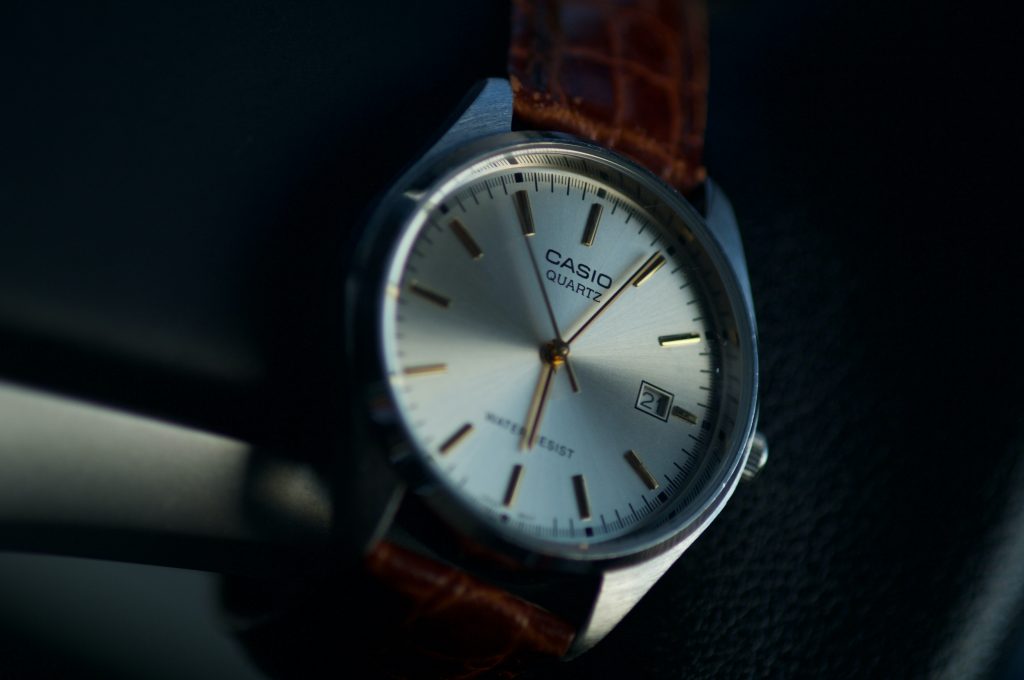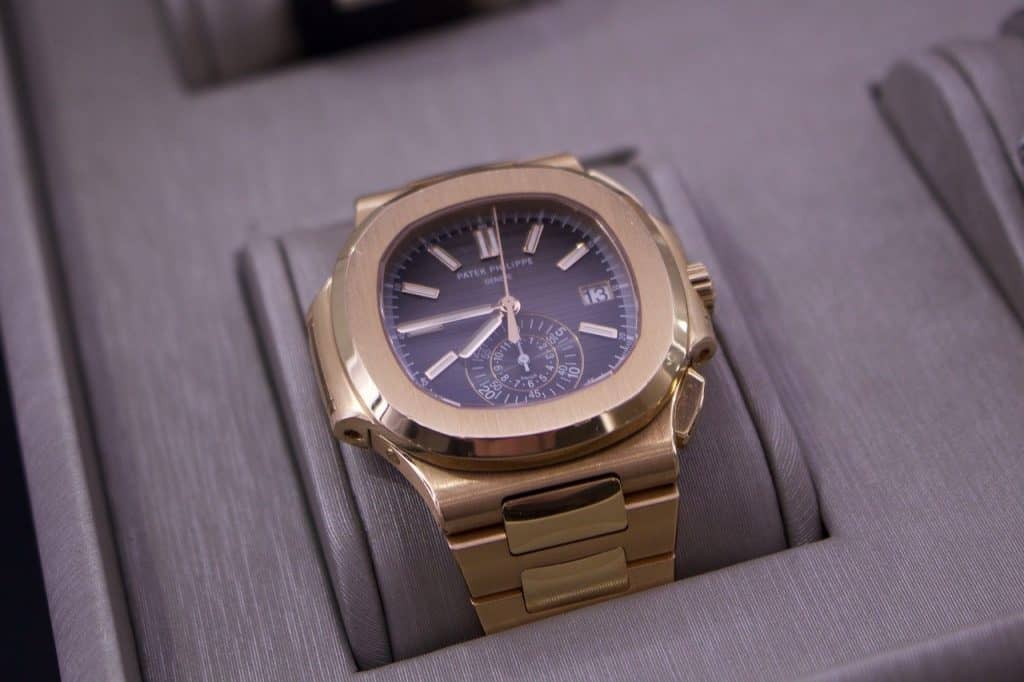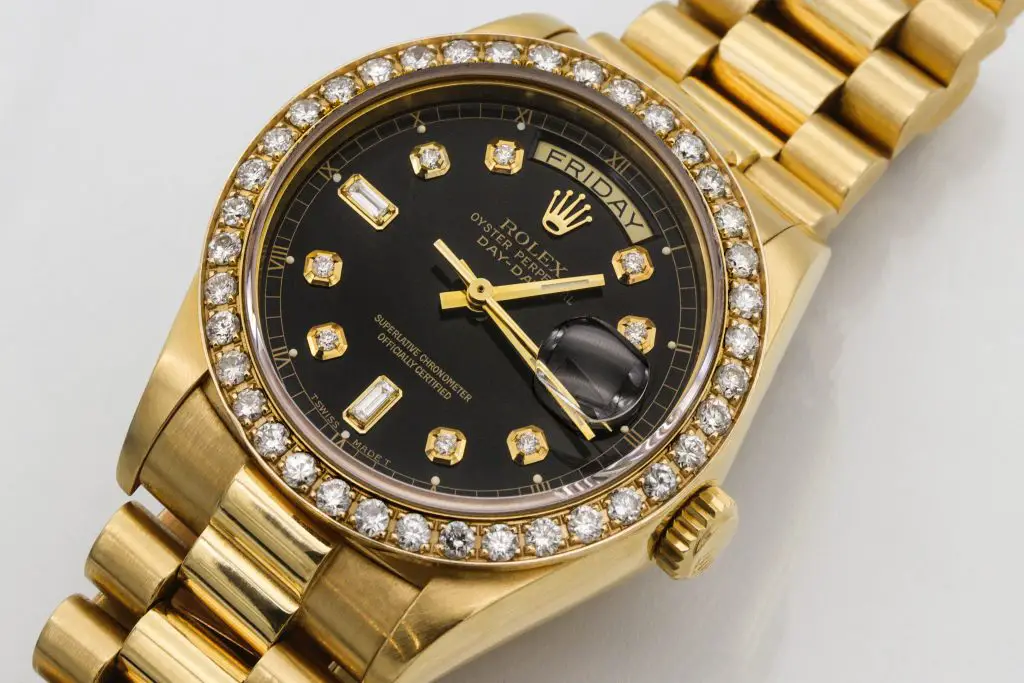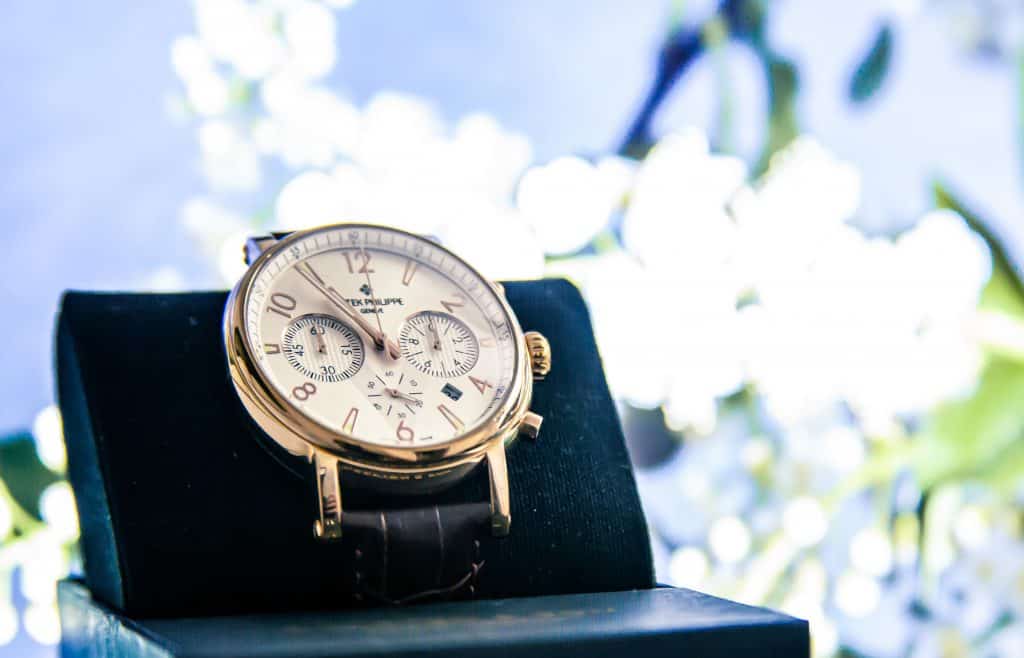Watches are always seen as a fantastic addition to anyone’s wardrobe. Luckily, there are many different timepieces out there, some more expensive than others. But how much should you spend on a watch?
You should spend around 1% of your yearly income on a watch. You can also save this 1% of your income for a few years and buy a more expensive watch if you like. Watches are amazing accessories but they are not worth getting into financial trouble over.
The 1% rule is one of the easiest to follow, but there’s a lot more going on when it comes to setting a budget for your new watch. In this article, we’ll discuss how you can pinpoint the budget for your watch according to your own financial situation!

Table of Contents
How Much Money Should You Spend On A Watch Based On Your Salary
The easiest rule to follow when it comes to purchasing a watch is to have it be around 1% of your yearly income. If we take a yearly income of $100.000 (easy for this example), you can allocate $1000 to your watch budget. For $1000, you can get a lot of beautiful watches, and if you pick strategically, you can even purchase multiple.
The example above took a pretty high annual income, but the 1% rule works great even for lower incomes. The average American makes about $50.000 a year, so that comes down to a total of $500 for your watch. And luckily for us, a lot of watches are $500 or less.
The great thing about this 1% rule is that it’s percentual. It works for anyone, whether you’re on minimum wage or a multi-millionaire. You always take 1%, no matter how much you make. For the high-earning individuals, your budget could come down to Rolex and Patek Phillipe levels, and for the average folks, the budget will be at a great looking Seiko or Citizen watch.
And as your income scales up, so does your budget!

Some people also like to allocate 1 month’s salary to their watch budget, but this only really works if you’re in a financially stable situation. Let’s say you make $3000 a month, it wouldn’t really make sense to purchase a $3000 watch.
Chances are that you depend on the $3000 a month to pay the rent and bills, so taking this money and splurging it all on a watch might not be the best idea.
If, on the other hand, you make like $15.000 a month, there’s a lot more room to play around. Yes, your expenses might be higher with such a salary, but if you take good care of your financials, there should be more room to play around with your budget.
Now, this doesn’t mean that you have to spend $15.000 on a watch, but going for a $5.000 watch would be a good purchase. Of course, this ultimately comes down to your own taste and preference.
With these rules in mind, it’s important to note that you don’t need to purchase a watch every year. What this basically means is that you can save up for a new watch.
Going back to the example of making $50.000 a year, which came down to a total budget of $500, you can decide to not purchase a watch for 2 or 3 years and save up for one. This leaves you with a budget of $1000 to $1500 (depending on how long you save up) and you have more options!
Factors That Influence How Much You Should Spend On A Watch
How much you should spend on a wathc is a different question than how much do you want to spend on a watch. We can create an estimate, like we did with the 1% rule, but maybe you don’t even want to spend 1% of your annual income on a watch. For some, spending $1000 on a watch is ridiculous, while others save multiple years to be able to purcahse such a watch.
What I’m saying is there are many factors that play a role on how much you should spend on a watch. Let’s go over those!
How Much Are You Willing To Spend On A Watch
Watches can be very expensive. Just look at the average Rolex; you’ll easily be out $15.000+. But a great-looking watch doesn’t HAVE to be expensive. And although many people would love to own an expensive watch, they just can’t justify buying one, even if they have the money for it.
After all, there are so many amazing-looking watches for 10% of the price. Some just love expensive watches for their namesake, but others just want a good-looking watch, no matter what brand it’s from. For those, it’s hard to justify spending thousands of dollars on a watch that looks similar to one that costs only $100.
It’s really up to you, in the end. What are you willing to spend on a watch? Can you justify spending a lot of money on a watch? Or are you fine with a cheaper watch? There is no right or wrong here, it’s just a matter of personal preference and taste.
How Much Do You Like The Watch
Another factor that plays a role is how much do you actually like the watch you’re buying. This once again ties into the question of ‘can I justify spending this much money on a watch?’.
If you simply like a watch that costs $1000, then it might be worth it to continue your search for a different watch. However, if you absolutely love the watch that costs $1000, that would make it a justifiable purchase!
Are You About To Make Any Big Financial Decisions/Purchases
Splurging on a watch could be quite fun, but if you’re about to make a big financial decision, then it might be better to wait. Let’s say you’re about to buy a house. In that case, you can definitely use the money you would otherwise spend on an expensive watch. So you have to ask yourself; is this watch worth it at this time?
Now, this mainly goes for those that want to buy a luxurious and expensive watch and not so much for those wanting to buy a $100 watch. Spending a few thousand dollars is much more ‘impactful’ than a few hundred, but the philosophy is the same.
What Does Your Financial Situation Look Like
Lastly, and most importantly, what does your financial situation look like? If you’re tight on money, then it might be best to not spend any of it on a new watch. Timepieces are great, but they are never worth going into debt on, so make an educated decision before you purchase a new one.
This will be different from person to person, so be honest with yourself on this one!
Should You Finance A Watch?

Financing a watch has several benefits; you can buy a watch without having to pay all the money upfront, you get to keep some spare cash for a little while longer, and you can profit from a price increase of the watch. However, financing a watch also has its risks, such as not being able to pay it off.
Generally, I’d recommend to not finance your watch. Financing is for most people a way to buy something they cannot actually afford. So in order to prevent trouble in the future, it might be best to buy the watch outright.
However, there are also some benefits to financing your new timepiece. When you finance a watch, you pay in terms and you don’t outright pay for it. One of the benefits is the fact that you’ll have some cash leftover. Instead of paying, say, $5000, you pay only $500. This leaves you $4500 that you can put into assets that maybe produce some extra income.
This is basically a way to put the money you would initially spend on a watch to work. And if you do it right, you could actually make money this way!
Another benefit is the fact that the terms will be based on the current price of the watch. Many luxury watches are known to appreciate in value, so if you finance the watch at $5000 and after all the terms, the watch is worth $6000, you essentially made $1000. Of course, this could also go the other way around, though!
Price Difference Of New And Old Watches Explained
Older watches are usually more expensive than new watches, simply because many of them have increased in rarity, resulting in an increase in price. Most older watches are no longer produced nowadays, so you’ll see them at higher prices than retail.
Unlike with most items, an old and used watch is usually not cheaper. In fact, most older watches are actually worth more. There’s a whole market for old or vintage watches with investors and collectors both searching for these vintage timepieces.
Most of the older watches are no longer produced today, increasing the price of the timepiece. Even a slight shift in color can alter the price dramatically. Just look at the Rolex Oyster Perpetual range. In 2020, they released new colorways, leading to the discontinuation of other colors. These are now no longer in production, leading to a drastic increase in price.
And since even these tiny changes can heavily drive up the price, it’s actually best to buy a watch new. Not only do you get a brand new watch, but chances are this one is for a great price as well.
Now, there are of course timepieces out there that haven’t really changed in price, or better yet, decreased, so you could do some digging for a better deal. But generally, an older luxury watch doesn’t mean a cheaper watch.
Is It Worth Buying A Expensive Luxury Watch?

In terms of quality and namesake, a luxury watch is definitely worth it. However, not everyone is in the position to purchase a luxury watch. Just because you can buy it does not necessarily mean you can afford it. If you’re in a financially stable situation and you really like the watch, it’s definitely worth it. Otherwise, it might be best to keep looking.
Buying an expensive luxury watch is always a big talking point. The question of whether or not it’s actually worth it will always come up. After all, it’s a rather expensive purchase. The cheapest Rolex watches start at $6000, so you can imagine what kind of price you’ll have to pay.
The most important thing you have to consider is your financial situation. If you’re financially stable and want to treat yourself with an expensive watch, then you can definitely do it. However, if you can barely get the money together for such a watch, ask yourself whether or not it’s really worth it.
Just as with most expensive things, it comes down to a simple question: Is it worth it to you?
Are Watches Good Investments?
A great watch can be a good investment, especially if you purchase a luxury watch. Many luxury watches actually increase in price over the years. If you plan to sell your watch after some time, the increase in price results in you making a profit, thus making the watch a good investment.
However, this definitely isn’t true for every watch. In fact, purchasing watches as an investment is something you really need to learn a lot about before diving in. Like any investment, there’s a certain degree of risk bound to it, and that’s no different here.
Whether or not your watch has incresed in price depends on a few things.
- How scarce is your watch?
- Is the watch still produced?
- What brand is your watch from?
These three questions are the most important when it comes to price increases. A watch that’s no longer produced will of course increase in value. This is simply because there’s a limited number of them. There’s scarcity.
But even if your watch is still produced, it could still be scarce. Certain watch brands don’t bulk-manufacture their watches, leading to scarcity even though it’s still produced. This mainly ties back to the brand of the watch as well. Luxury watch brands don’t make as many watches as the cheaper watch brands. And the more there are, the lower the price will be.
For example, a simple Casio watch you bought for $150 a year ago is almost guaranteed to have no price increase. A vintage Rolex, on the other hand, has probably seen an increase in price.
